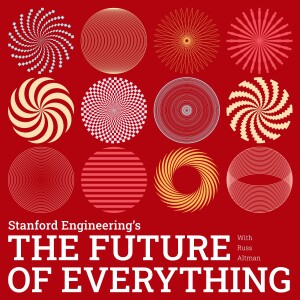
Using math to improve photographs, with expert guest Gordon Wetzstein. Such methods have exploded in recent years and have wide-ranging impacts from improving your family photos, to making self-driving cars safer, to building ever-more-powerful microscopes. Somewhere in between hardware and software, he says, is the field of computational imaging, which makes cameras do some pretty amazing things. Wetzstein and host Russ Altman bring it all into focus on this episode of Stanford Engineering’s The Future of Everything podcast.
Episode Transcripts >>> The Future of Everything Website
Connect with Russ >>> Threads or Twitter/X
Connect with School of Engineering >>> Twitter/X
Chapters:
(00:00:00) Introductions
Host Russ Altman introduces the guest, Gordon Wetzstein as well as the concept of non-line-of-sight imaging.
(00:02:58) Computational Imaging
Gordon Wetzstein explains the concept of computational imaging and the way it integrates hardware and software for optimal image capture.
(00:04:22) High Dynamic Range (HDR) Imaging & Focal Stacking
An explanation of what HDR is and how it captures high-contrast scenes, and the similar process of focal stacking, using multiple images to create depth.
(00:09:56) Non-Line-of-Sight Imaging
(00:15:51) Optical Computing: Extending Hardware Capabilities
Insights into optical computing, explaining how specially designed hardware can preprocess data for AI algorithms.
(00:18:08) Applications of Optical Computing
Exploration of applications for optical computing in power constraint systems and increased efficiency in data centers.
(00:23:07) The Intersection of AI, Physics, and Computer Graphics
Synergy between AI, physics, and computer graphics in creating 3D content and models.
(00:25:47) Generative AI to Create 3D from 2D
Exploring the challenge of generating 3D digital humans from unstructured 2D images using algorithms
(00:32:02) Challenges & Advancements in VR and AR Design
Connect With Us:
Episode Transcripts >>> The Future of Everything Website
Connect with Russ >>> Threads or Twitter/X
Connect with School of Engineering >>> Twitter/X
More Episodes
 2023-08-18
2023-08-18
 2023-08-11
2023-08-11
 2023-08-04
2023-08-04
 2023-07-28
2023-07-28
 2023-07-14
2023-07-14
 2023-06-30
2023-06-30
 2023-06-23
2023-06-23
 2023-06-16
2023-06-16
 2023-06-09
2023-06-09
 2023-06-02
2023-06-02
 2023-05-19
2023-05-19
 2023-05-12
2023-05-12
 2023-05-05
2023-05-05
 2023-04-21
2023-04-21
 2023-04-14
2023-04-14
Create your
podcast in
minutes
- Full-featured podcast site
- Unlimited storage and bandwidth
- Comprehensive podcast stats
- Distribute to Apple Podcasts, Spotify, and more
- Make money with your podcast
It is Free
- Privacy Policy
- Cookie Policy
- Terms of Use
- Consent Preferences
- Copyright © 2015-2024 Podbean.com





